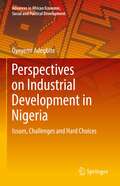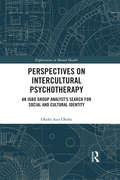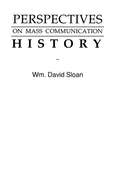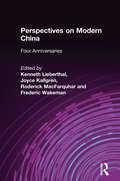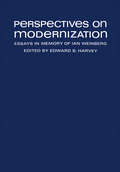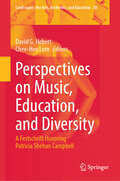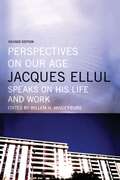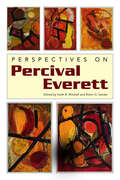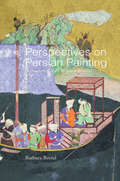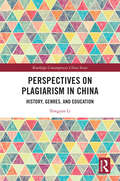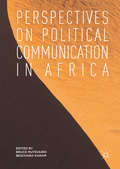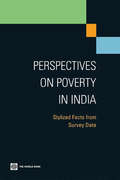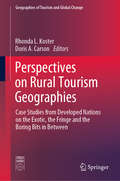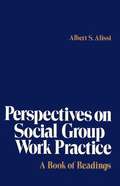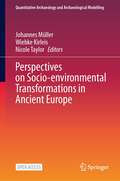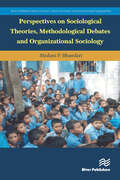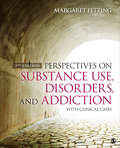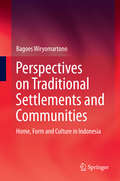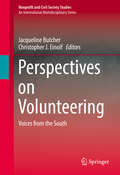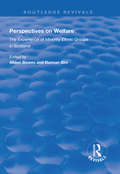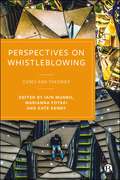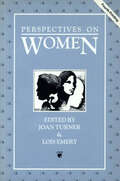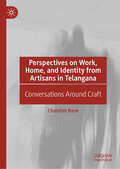- Table View
- List View
Perspectives on Industrial Development in Nigeria: Issues, Challenges and Hard Choices (Advances in African Economic, Social and Political Development)
by Oyeyemi AdegbiteThis book constitutes a critical review of Nigeria’s attempts to achieve rapid industrial development since independence from Britain in 1960. It details the issues, challenges, and hard choices confronted by Nigerian political leadership and highlights the reasons why the country ultimately failed to achieve industrial take-off in spite of its abundant human and material resources. Chapters take a retrospective look at government industrial development policies and programs, including the steel industry, agro-allied and forest-based industries, and the industrial estate development program. The book also discusses tariff and trade policies, incentives and disincentives to foreign direct investment (FDI) in the manufacturing sector, and small and medium enterprise (SME) development. The book concludes with a look at the recent drive towards regional integration as well as the potential impact of the Economic Partnership Agreement (EPA) between the European Union and sixteen countries of West Africa. Providing an exhaustive history of Nigeria’s economic and industrial development, this volume will be of interest to researchers and students of African economics, development studies, and industrial organization, as well as policy makers in both the public and private sectors.
Perspectives on Intercultural Psychotherapy: An Igbo Group Analyst’s Search for Social and Cultural Identity (Explorations in Mental Health)
by Okeke Azu-OkekeIn Perspectives on Intercultural Psychotherapy, Okeke Azu-Okeke explores cultural identity by drawing on his own experience as the first and only Black trainee in an Institute for Group Analysis in London and the impact this has had on his work as a lecturer and supervisor, as well as research from his group analysis sessions over many years to contribute a deeper awareness of the serious aspects of colonialism. Drawing from the perspective of an Igbo man of the older generation who grew up in two conflicting cultures, the traditional Igbo culture of Nigeria and that of the British colonialists, Okeke provides a thorough study of how cultural identity can influence research and practice in whatever form it takes: the academic, the theoretical, the economic and the psychological. The book discusses how ignoring deeply held social and spiritual values can alienate many trainees and potential clients from participating in the professions of psychotherapy and counselling. It also reflects on the author’s research into traditional Igbo methods of healing and compares these with Western models, especially of group analysis, and discusses how mutual learning can be achieved. This book will be of great interest to counsellors and psychotherapists; arts therapists; sociologists and anthropologists; policy makers engaged in health and social care policies; practitioners of alternative medicine; social workers and mental health workers at all levels.
Perspectives on Mass Communication History (Routledge Communication Series)
by Wm. David SloanThis unique volume is based on the philosophy that the teaching of history should emphasize critical thinking and attempt to involve the student intellectually, rather than simply provide names, dates, and places to memorize. The book approaches history not as a cut-and-dried recitation of a collection of facts but as multifaceted discipline. In examining the various perspectives historians have provided, the author brings a vitality to the study of history that students normally do not gain. The text is comprised of 24 historiographical essays, each of which discusses the major interpretations of a significant topic in mass communication history. Students are challenged to evaluate each approach critically and to develop their own explanations. As a textbook designed specifically for use in graduate level communication history courses, it should serve as a stimulating pedagogical tool.
Perspectives on Modern China: Four Anniversaries (Studies On Modern China)
by Frederic Wakeman Kenneth Lieberthal Roderick MacFarquhar Joyce KallgrenThe conveners (the editors of this book) of the September 1989 Four Anniversaries China Conference in Annapolis, asked the contributors to look back from that point in time to consider four major events in modern Chinese history in the perspective of the rapid changes that were shaping the Chinese society, economy, polity, and sense of place in the world in the 1980s, a time when China was making rapid strides toward becoming more integrated with the outside world. With contributions by distinguished scholars in the field, the four anniversaries considered are the High Qing, the May Fourth Movement, forty years of communism in China, and ten years of the Deng era.
Perspectives on Modernization: Essays in Memory of Ian Weinberg
by Edward HarveyPerspectives on Modernization is published in memory of Ian Weinberg, a sociologist of brilliant promise who died at the age of thirty. It consists of essays by his colleagues, students, and teachers which reflect upon and carry further Ian Weinberg's major scholarly concerns – the processes of industrialization and modernization of societies. The book begins with an essay by Ian Weinberg which was presented at the annual meeting of the American Sociological Association, 1968. It is followed by a paper of wide scope and interest, Wilbert E. Moore's 'Normative Conflict in Stages of Cultural Change.' Noting that the study of rapid social change can no longer be confined to the so-called modernizing countries, Moore argues that comparable normative conflicts occur at comparable stages of cultural change. Rainer C. Baum and Charles Tilly are concerned with the serious gaps in the theory of modernization and politics. Baum is specifically concerned with developing a political analogue to the theory of economic development; Tilly concentrates on a longitudinal study of the relationship between modernization and collective political conflicts. S.D. Clark writes of patterns of urban growth, looking at two exceptions to the well-studied outward movement of immigrants in Canadian cities. Edward Shorter studies the modernization of sexual attitudes by analysing illegitimacy. The last three papers approach modernization through economic changes and development: H. Nishio analyses the relationships between political control and economic development in Japan over two centuries; Stanely R. Barrett studies the transition of the economy in a Nigerian utopian community from communalism to partial private enterprise; and L.R. Marsden, E.B. Harvey, and J. Bulcock explore the relationship of literacy and economic development in thirty-nine African countries. The volume includes an introduction by the editor and an outline of Ian Weinberg's short but brilliant career. These essays are, like the work of the man they seek to honour, wide ranging and intellectually provocative in their approach to a complex question. The volume is a fitting tribute to both the man and the spirit of intellectual vitality to which he was committed.
Perspectives on Music, Education, and Diversity: A Festschrift Honoring Patricia Shehan Campbell (Landscapes: the Arts, Aesthetics, and Education #38)
by Chee-Hoo Lum David G. HebertThis book is a Festschrift in celebration of Patricia Shehan Campbell&’s impact for more than six decades as an eminent teacher-educator, musician and researcher in the fields of music education and ethnomusicology. Campbell&’s oeuvre of scholarly work is wide-ranging, spanning practical resources for music teachers to facilitate the teaching and learning of different musical cultures of the world, to diverse perspectives on the musical cultures of children, to the emblematic approach of World Music Pedagogy fleshed out in the Global Music Series with Oxford University Press, the Routledge World Music Pedagogy Series and her educational work with Smithsonian Folkways Recordings, alongside her extensive work with ethnomusicologists and community musicians and scholars across the world. Notable scholars from the fields of music education, ethnomusicology and community music, including Campbell&’s doctoral graduates and colleagues from across recent decades, are contributors in this Festschrift to reflect upon her scholarly work and critically dialogue on several topics: perceptions of diversity in school music and children&’s musical cultures, applied ethnomusicology, music education and its relation with the multicultural and social justice, pedagogical approaches towards cultural diversity in music and bridging communities and culture bearers.
Perspectives on Our Age: Jacques Ellul Speaks on his Life and Work
by Jacques EllulOriginally broadcast on CBC Radio's Ideas as a series of interviews, Jacques Ellul's first-person approach here makes his ideas accessible to readers looking for new ways of understanding our society, and also gives unique new insight into Ellul's life, his work, and the origins and development of his beliefs and theories. Jacques Ellul, historian, theologian, and sociologist, was one of the foremost and widely known contemporary critics of modern technological society.
Perspectives on Percival Everett (Margaret Walker Alexander Series in African American Studies)
by Keith B. MitchellPercival Everett (b. 1956) writes novels, short stories, poetry, and essays and is one of the most prolific, acclaimed, yet underexamined African American authors working today. Although to date Everett has published eighteen novels, three collections of short fiction, three poetry collections, and one children's book, his work has not garnered the critical attention that it deserves. Perhaps one of the most vexing problems scholars have had in trying to situate Everett's work is that they have found it difficult to place him and his work within a prescribed African American literary tradition. Because he happens to be African American, critics have expectations of so-called authentic African American fiction; however, his work often thwarts these expectations. In Perspectives on Percival Everett, scholars engage all of his creative production. On the one hand, Everett is an African American novelist. On the other hand, he pursues subject matters that seemingly have little to do with African American culture. The operative word here is “seemingly;” for as these essays demonstrate, Everett's works falls well within as well as outside of what most critics would deem the African American literary tradition. These essays examine issues of identity, authenticity, and semiotics, in addition to postmodernism and African American and American literary traditions—issues essential to understanding his aesthetic and political concerns.
Perspectives on Persian Painting: Illustrations to Amir Khusrau's Khamsah
by Dr Barbara BrendThis is a detailed study of the illustrations to Amir Khusrau's Khamsah, in which twenty discourses are followed by a brief parable, and four romances. Amir Khusrau (1253-1325) lived the greater part of adventurous life in Delhi; he composed in Persian, and also in Hindi. From the point of view of manuscript illustration, his most important work is his Khamsah (Quintet'). Khusrau's position as a link between cultures of Persia and India means that the early illustrated copies of the Khamsah have a particular interest. The first extant exemplar is from the Persian area in the late 14th century, but a case can be made that work was probably illustrated earlier in India.
Perspectives on Plagiarism in China: History, Genres, and Education (ISSN)
by Yongyan LiThis book examines the issue of plagiarism in the Chinese context of history and education, both in classical and contemporary times.In view of the effort on a global scale to fight against plagiarism and consolidating anti-plagiarism education, this book examines how plagiarism is conceptualized and addressed in the Confucian Heritage Culture society of China. Employing qualitative content analysis, genre analysis, and discourse analysis to examine Chinesemedium textual materials of different kinds, this book offers new perspectives on the question of plagiarism in China. These textual materials include classic and ancient Chinese books, modern newspapers in China (1840–1949), academic literature, correspondence texts on plagiarism cases, and textbooks published in China on Chinese and English academic writing.Inspiring future research and educational initiatives aimed at addressing the problem of plagiarism in the contemporary world, this book will appeal to students and scholars of education, Chinese history, and Asian studies.
Perspectives on Political Communication in Africa
by Bruce Mutsvairo Beschara KaramThis edited collection is a cutting-edge volume that reframes political communication from an African perspective. Focusing on sub-Saharan Africa and occasionally drawing comparisons with other regions of the world, this book critically addresses the development of the field focusing on the current opportunities and challenges within the African context. By using a wide variety of case studies that include Mozambique, Zambia, Rwanda, Zimbabwe, Ghana, Kenya, Uganda, South Africa, Ivory Coast and Nigeria, the collection gives space to previously understudied regions of sub-Saharan Africa and challenges the over-reliance of western scholarship on political communication on the continent.
Perspectives on Poverty in India
by World Bank StaffThe book examines India's experience with poverty reduction in a period of rapid economic growth. Marshalling evidence from multiple sources of survey data and drawing on new methods, the book asks how India's structural transformation - from rural to urban, and from agriculture to nonfarm sectors - is impacting poverty. Our analysis suggests that since the early 1990s, urban growth has emerged as a much more important driver of poverty reduction than in the past. We focus in particular on the role of small and medium size conurbations in India, both as the urban sub-sector in which urban poverty is overwhelmingly concentrated, and as a sub-sector that could potentially stimulate rural-based poverty reduction. Second, in rural areas, we focus on the nature of intersectoral transformation out of agriculture into the nonfarm economy. Stagnation in agriculture has been accompanied by dynamism in the nonfarm sector, but there is much debate about whether the growth seen has been a symptom of agrarian distress or a source of poverty reduction. Finally, alongside the accelerating economic growth and the highly visible transformation that is occurring in India's major cities, inequality is on the rise. This is raising concern that economic growth in India has by-passed significant segments of the population. The third theme on social exclusion asks if, despite the dramatic growth, historically grounded inequalities along lines of caste, tribe and gender have persisted. This book would be of interest for policymakers, researchers, non-governmental organizations, and international agencies-from India and abroad--who wish to know more about India's experience of the last two decades in reducing poverty.
Perspectives on Rural Tourism Geographies: Case Studies from Developed Nations on the Exotic, the Fringe and the Boring Bits in Between (Geographies of Tourism and Global Change)
by Rhonda L. Koster Doris A. CarsonThis book examines rural tourism across three different contexts, acknowledging the complexity of rural places. It applies a systematic comparative framework across nine case studies from Australia, Canada and Sweden. The case studies address the uniqueness of different rural spaces, while the framework incorporates many theoretical aspects from human geography including spatial, historic, institutional, demographic, socio-economic and network perspectives. In the course of applying this comparative case study framework, the book identifies numerous implications for planning and policy in rural settings. These contributions from international, expert authors help to identify the opportunities and challenges that affect rural regions, from places at the urban fringe to exotic remote spaces and taking in the ‘boring bits in between.’ Both the analysis and the framework used will be of value to scholars and students of rurality, tourism, regional development, rural policy, geography, and destination management. Readers will gain a deeper understanding of the rural context in developed countries and a robust conceptualization of rural tourism geographies.
Perspectives on Social Group Work Practice
by Albert S. AlissiNot simply another "how-to" book, this provocative collection of readings does not advance a single viewpoint or approach to group work. Instead, the 25 selections present the full spectrum of classic and current perspectives, providing student and practitioner alike with a sound basis for evaluating contemporary practice and for formulating a personal approach to social group work. The historical and conceptual roots of modern social group work methods are examined in Part I, "Conceptual Foundations" which contains some of the classic statements in the field. Part II, "Current Perspectives", explores the most widely influential contemporary models of group work, "social goals" perspectives, "remedial" perspectives, and "mediative" perspectives. The two-part section that concludes the volume focuses on applications: group work is first discussed in relation to family and community casework and administration; then, self-help groups and other techniques used in the fields of medicine, counseling, and psychology are surveyed in light of their implications for social workers. To encourage the reader's active participation in the development of an individual philosophy and approach to social group work, Dr. Alissi concludes each chapter with probing study questions. These open-ended questions stimulate comparisons among the methods presented and urge the reader to relate new ideas to his or her own experience in the field. Introductions to each part and chapter also stress comparative aspects. An annotated list of articles and books on the subject of each chapter allows the reader to explore it in greater depth. A stimulating and systematic exposure to the most important ideas in social group work today, "Perspectives on Social Group Work Practice" expands the repertoire of working concepts vital to contemporary practice.
Perspectives on Socio-environmental Transformations in Ancient Europe (Quantitative Archaeology and Archaeological Modelling)
by Johannes Müller Nicole Taylor Wiebke KirleisThis open access book brings together key issues from transformative processes and events across Europe (and in some cases beyond) from 15,000 to 1 BCE. This volume covers the research output produced by the Collaborative Research Centre (CRC) 1266 "Scales of Transformation" – the first interdisciplinary centre to diachronically investigate transformations in past societies with a summary of their individual aspects from the Late Palaeolithic to the Roman Period. Following the introduction, the book is divided into three main sections: In "Identification of anatomies of socio-environmental transformation", the concept of scales of transformations is first explained, and the various parameters of transformational change are identified. This is followed by "Expressions of socio-environmental transformations: from climate preconditions to decision making", in which transformation processes are illustrated with individual examples. The third major part of the book deals with"Perspectives on decision making processes in socio-environmental transformations". In conclusion, the results are framed in a broad temporal framework, and patterns of socio-environmental change are presented across common time frames from the Eastern Mediterranean to Scandinavia. This book is of interest to researchers in archaeology and palaeoecology.
Perspectives on Sociological Theories, Methodological Debates and Organizational Sociology
by Medani P. BhandariThis book stands as the full body of scholarly work on western theories of social sciences. The book contents three chapters. The first part gives the overall scenario of theories, the second part provides the pathway to research destination – the research method, and the third and final part is the destination of the substantive field of study and the roles of international organizations on social, political, economic, environmental regimes creation as well as to other social and development functions of international organizations. Sociology examines the social actors’ activities in society and social problems. Western Scholars have developed many social theories, which address the underlying causes such as social conflicts and inequalities, and many formal and informal social organizations are involved to minimize the challenges of inequalities. The study of social organizations is a relatively new phenomenon in sociology. Broadly its historical root can be traced from Greek civilization (Plato, Aristotle), and it has mostly flourished since the Enlightenment Era. However, empirical studies show that the scientific study of organizations began only from the 19th and 20th century. Among the scholars of these centuries, the contributions of Karl Marx, Ferdinand Tönnies, Émile Durkheim, Ludwig Gumplovicz, Vilfredo Pareto, Max Weber, and Talcott Parsons are considered as pillars of sociology. This book intends to answer the broad and major questions of theories, methods, and the international organization studies in social sciences, particularly in sociology and to provide the basic concepts of social theories, application of methods in research (qualitative), and elaborate the factual reality "why study of international organization is also subject of sociological study". The book presents the perspectives of organizational sociology in way that scholarly readers can see the linkages political sciences, sociology and slightly economic in addressing the roles and issues of the international organizations.
Perspectives on Substance Use, Disorders, and Addiction: With Clinical Cases
by Margaret A. FettingPerspectives on Substance Use, Disorders and Addiction, Second Edition, is a philosophical and clinical text that suggests new ways to think about the relationships, enjoyment, and troubles with substances of pleasure. The book is designed for students and clinicians who come in contact with and treat individuals and families struggling with the causes and consequences of substance use disorders and addiction. The second edition of Perspectives presents a refreshing blend of ancient and contemporary ideas on the natural pleasures and potential powers of alcohol and drugs in our everyday individual and collective lives.
Perspectives on Substance Use, Disorders, and Addiction: With Clinical Cases
by Margaret A. FettingPerspectives on Substance Use, Disorders and Addiction, Second Edition, is a philosophical and clinical text that suggests new ways to think about the relationships, enjoyment, and troubles with substances of pleasure. The book is designed for students and clinicians who come in contact with and treat individuals and families struggling with the causes and consequences of substance use disorders and addiction. The second edition of Perspectives presents a refreshing blend of ancient and contemporary ideas on the natural pleasures and potential powers of alcohol and drugs in our everyday individual and collective lives.
Perspectives on Traditional Settlements and Communities
by Bagoes WiryomartonoThis book covers the relationship between societies and their culture in the context of traditional settlement in Indonesia. The focus of the study is on the search for meanings of local concepts. This study reveals and analyzes the concepts concerning home and their sociocultural strategies for maintaining a sense of community and identity. In this study, identifying local concepts becomes the hallmark and the hub of analyses that explore, verify and establish relations between ideas and phenomena. Based on these relations, this study attempts to capture the reality of the local world that upholds and sustains the communities' values, norms and principles for what they may call a homeland. The book is organized into two parts. Part I describes a cross-regional habitation in Indonesia, while Part II presents four ethnic regions of Indonesia - Sa'dan Toraja, Bali, Naga and Minangkabau. Their unique traditions, customs, beliefs and attitudes serve to provide diversity in terms of their backgrounds and lifestyles, though they share the challenge of sustaining their sense of home in the face of modernity as characterized by changes and developments toward a technologically industrialized society. The central research questions are - What is development in terms of culture and environmental sustainability? How do these communities respond to modernity?
Perspectives on Volunteering
by Jacqueline Butcher Christopher J. EinolfThis volume overlooks the distinct expressions and awareness of volunteering in the lived reality of people from different regions of the world. By casting the net widely this book not only expands the geographic reach of experiences, models and case studies but also transcends the conventional focus on formal volunteering. It highlights institutional forms of volunteering specific to developing nations and also describes volunteering that is more loosely institutionalized, informal, and a part of solidarity and collective spirit. As a result this book provides a different look at the values, meaning, acts and expressions of volunteering. The chapters in this book consist of essays and case studies that present recent academic research, thinking and practice on volunteering. Working from the premise that volunteering is universal this collection draws on experiences from Latin America, Africa including Egypt, and Asia. This book focuses on developing countries and countries in transition in order to provide a fresh set of experiences and perspectives on volunteering. While developing countries and countries in transition are in the spotlight for this volume, the developed country experience is not ignored. Rather the essays use it as a critical reference point for comparisons, allowing points of convergence, disconnect and intersection to emerge.
Perspectives on Welfare: Experience of Minority Ethnic Groups in Scotland (Routledge Revivals)
by Alison Bowes Duncan SimFirst published in 1997, this volume examines the issue that, throughout Britain, studies of social, health and housing services have found discrimination, insensitive practices and lack of awareness of the needs of a multi-racial population. The relationships between these services and their minority ethnic users remain problematic. This book focuses on the lessons offered by the Scottish experience. Original research-based contributions focus in turn on housing services, social work and health services, examining the perspectives of service users and their needs and experiences, and comparing the perspectives of professionals in each field. The implications of these perspectives for policy, both local and national, are explored in the context of recent national developments. Methodological issues are discussed throughout the book and the complementarity of different research perspectives explored. Housing, social work and health professionals throughout Britain will find sensitive discussion here of issues which face them daily in their work. Researchers will find original data, explored in the context of nationally relevant research issues and policies. Scottish researchers and practitioners will find detailed discussion of how far the Scottish experience is distinctive, how far it offers lessons for the national picture and how far it can learn from elsewhere.
Perspectives on Whistleblowing: Cases and Theories
by Iain Munro, Kate Kenny and Marianna FotakiSociety acknowledges whistleblowers as truth-tellers who bring urgent concerns to the public’s attention, but at the same time they are subjected to a host of retaliations including smear campaigns, unemployment, prison and exile. Investigating high profile case studies including Kiriakou, Snowden, Foxley and Assange, this book discusses recent transformations in whistleblowing practice. With first-person accounts by prominent whistleblowers, it explores the ethical and political dynamics of whistleblowing, use of new technologies in the practice and formal channels for whistleblower protections and legal reforms. Written by professionals and activists who support whistleblowers, this will be an invaluable resource for researchers working in the field as well as journalists, practitioners and legal professionals.
Perspectives on Women in the 1980s
by Joan Turner Lois EmeryWe are now fifteen years into the second wave of feminism, and public opinion polls show majority support for all the basic issues raised by the women’s movement. This collection of articles focuses on strategies and directions for the movement that will enable all women to benefit from changing attitudes in the 1980s.
Perspectives on Work, Home, and Identity From Artisans in Telangana: Conversations Around Craft
by Chandan BoseProviding an ethnographic account of the everyday life of a household of artisans in the Telangana state of southern India, Chandan Bose engages with craft practice beyond the material (in this case, the region's characteristic murals, narrative cloth scrolls, and ritual masks and figurines). In situating the voice of the artisans themselves as the central focus of study, simultaneous and juxtaposing histories of craft practice emerge, through which artisans assemble narratives about work, home, and identity through multiple lenses. These perspectives include: the language artisans use to articulate their experience of materials, materiality, and the physical process of making; the shared and collective memory of practitioners through which they recount the genealogy of the practice; the everyday life of the household and its kinship practices, given the integration of the studio-space and the home-space; the negotiations between practitioners and the nation-state over matters of patronage; and the capacities of artisans to both conform to and affect the practices of the neo-liberal market.
Perspectives on the American Revolution
by Angelo ParraTo some, England had the right to govern the thirteen American colonies. To others, England was violating the colonists' rights. Still others took no side. Which would prevail: loyalty to the king, freedom now, or peace at any price? Read these essays to find out. (Set of 6 with Teacher's Guide and Comprehension Question Card)
